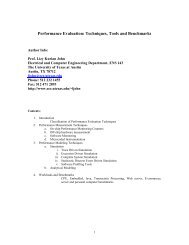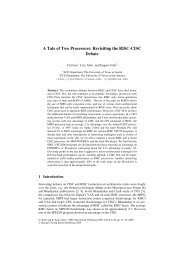- Page 1 and 2: Copyright by William Lloyd Bircher
- Page 3 and 4: Predictive Power Management for Mul
- Page 5 and 6: Acknowledgements I would like to th
- Page 7 and 8: Predictive Power Management for Mul
- Page 9 and 10: Table of Contents Chapter 1 Introdu
- Page 11 and 12: 5.3.6 Memory ......................
- Page 13 and 14: List of Tables Table 1.1 Windows Vi
- Page 15 and 16: List of Figures Figure 1.1 CPU Core
- Page 17 and 18: Chapter 1 Introduction Computing sy
- Page 19: increases the overhead of adaptatio
- Page 23 and 24: Active Core Activity Idle except fo
- Page 25 and 26: 4. Design a predictive power manage
- Page 27 and 28: 1.7 Organization This dissertation
- Page 29 and 30: Chapter 2 Methodology The developme
- Page 31 and 32: 2.1.2 Subsystem-Level Power in a Se
- Page 33 and 34: The main components are subsystem p
- Page 35 and 36: Table 2.4 Laptop System Description
- Page 37 and 38: 2.3 Performance Counter Sampling To
- Page 39 and 40: instruction streams that exercise a
- Page 41 and 42: the power trace to the PMC trace co
- Page 43 and 44: The first bar in Figure 3.1 “Fetc
- Page 45 and 46: Table 3.4 Instruction Linear Regres
- Page 47 and 48: long time to complete, more aggress
- Page 49 and 50: power adaptations as c-states. Thes
- Page 51 and 52: Core Power (Watts) 60 50 40 30 20 1
- Page 53 and 54: The difference between C0-Idle and
- Page 55 and 56: case error is 3.3%. Alternatively s
- Page 57 and 58: 3. Based on basic domain knowledge,
- Page 59 and 60: 3.6 Summary This section describes
- Page 61 and 62: Power (Watts) 30 25 20 15 10 5 0 Co
- Page 63 and 64: workloads become more memory-bound,
- Page 65 and 66: At the other extreme, the productiv
- Page 67 and 68: processor. In both platforms the to
- Page 69 and 70: Table 4.1 Subsystem Power Standard
- Page 71 and 72:
the case of I/O, the observed workl
- Page 73 and 74:
average distribution. The apparent
- Page 75 and 76:
Table 4.4 Workload Phase Classifica
- Page 77 and 78:
Frequency 1 10 100 1000 PhaseLength
- Page 79 and 80:
power management, it is shown that
- Page 81 and 82:
power measurement hardware for mult
- Page 83 and 84:
memory. Since the number of main me
- Page 85 and 86:
TLB Misses - Loads/stores that miss
- Page 87 and 88:
The form of the subsystem power mod
- Page 89 and 90:
5.2.2 Memory This section considers
- Page 91 and 92:
prefetch traffic does increase afte
- Page 93 and 94:
average access time to the distant
- Page 95 and 96:
Watts Figure 5.6 Disk Power Model (
- Page 97 and 98:
exhibits little variation in power
- Page 99 and 100:
The memory model averaged about 9%
- Page 101 and 102:
efficiency rather than performance.
- Page 103 and 104:
through the application GUI. The nu
- Page 105 and 106:
1 data cache access rate dominates
- Page 107 and 108:
periods of disconnect, cache snoop
- Page 109 and 110:
5.3.4 CPU To test the extensibility
- Page 111 and 112:
Despite this, high accuracy of less
- Page 113 and 114:
Light activity yields higher precha
- Page 115 and 116:
5.3.8 Chipset The Chipset power mod
- Page 117 and 118:
applied to the GPU core logic, larg
- Page 119 and 120:
Chapter 6 Performance Effects of Dy
- Page 121 and 122:
can be considered as predictors whi
- Page 123 and 124:
improvement for low idle core frequ
- Page 125 and 126:
6.1.5 Direct Performance Effects Si
- Page 127 and 128:
of SPEC CPU2000 workloads, almost n
- Page 129 and 130:
adjusting a hysteresis timer. The t
- Page 131 and 132:
increase/decrease time. Since the i
- Page 133 and 134:
In order to reduce p-state performa
- Page 135 and 136:
performance loss and power consumpt
- Page 137 and 138:
eactive scheme used in Windows Vist
- Page 139 and 140:
Watts Watts Watts Watts Watts 150 1
- Page 141 and 142:
7.2 Commercial DVFS Algorithm Exist
- Page 143 and 144:
of idle-active transitions in the c
- Page 145 and 146:
workload/operating systems adds and
- Page 147 and 148:
instructions. In APCI[Ac07] termino
- Page 149 and 150:
confidence level will drop below a
- Page 151 and 152:
First, prediction accuracy is consi
- Page 153 and 154:
coverage of 43% and accuracy over 9
- Page 155 and 156:
which corresponds to the DVFS sched
- Page 157 and 158:
Table 7.6: SYSmark 2007 Power and P
- Page 159 and 160:
In this case the predictor achieves
- Page 161 and 162:
2007 power consumption contains man
- Page 163 and 164:
Chapter 8 Related Research This sec
- Page 165 and 166:
8.2 System-Level Power Characteriza
- Page 167 and 168:
prediction scheme in this dissertat
- Page 169 and 170:
Chapter 9 Conclusions and Future Wo
- Page 171 and 172:
the duration of power and performan
- Page 173 and 174:
execution, portions of pipelines or
- Page 175 and 176:
[BiJo06-1] W. L. Bircher and L. Joh
- Page 177 and 178:
the 2005 ACM SIGMETRICS Internation
- Page 179 and 180:
[HaKe07] H. Hanson, S.W. Keckler, K
- Page 181 and 182:
[JoMa01] R. Joseph and M. Martonosi
- Page 183 and 184:
[LiBr05] Y. Li, D. Brooks, Z. Hu, a
- Page 185 and 186:
[Os06] Open Source Development Lab,
- Page 187 and 188:
[WaCh08] X. Wang and M. Chen. Clust
- Page 189 and 190:
[PiSh01] P. Pillai and K. G. Shin.




